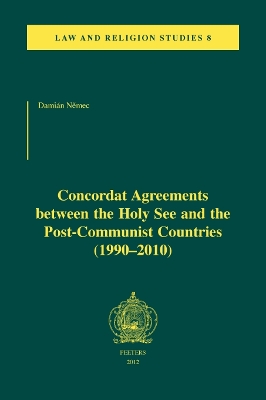Law and Religion Studies
1 primary work
Volume 8
Concordat Agreements between the Holy See and the Post-Communist Countries (1990-2010)
by David Nemec
Published 18 September 2012
The collapse of the communist regimes in Europe at the turn of
1980's/1990's led to the necessary to seek new models of State and
Churches relations in the post-Communist countries. However, even though
two decades, 1990-2010, have not been enough to bring the process of
transformation to completion, we can state that, at that time, the basic
regulative principles of the relations in the politico-religious area
have been specified and legally laid down.
The study Concordat Agreements between the Holy See and the
Post-Communist Countries (1990-2010) endeavours to describe
and evaluate in a systematic manner a relatively extensive area of
contractual regulation of relations between the Catholic Church and the
post-Communist countries on the basis of research of concordat
agreements. On the basis of comparative evaluation, it shows the
prevailing models of solutions as well as their inner adequacy to the
religious phenomenon and to the pluralistic democratic social order.
1980's/1990's led to the necessary to seek new models of State and
Churches relations in the post-Communist countries. However, even though
two decades, 1990-2010, have not been enough to bring the process of
transformation to completion, we can state that, at that time, the basic
regulative principles of the relations in the politico-religious area
have been specified and legally laid down.
The study Concordat Agreements between the Holy See and the
Post-Communist Countries (1990-2010) endeavours to describe
and evaluate in a systematic manner a relatively extensive area of
contractual regulation of relations between the Catholic Church and the
post-Communist countries on the basis of research of concordat
agreements. On the basis of comparative evaluation, it shows the
prevailing models of solutions as well as their inner adequacy to the
religious phenomenon and to the pluralistic democratic social order.
